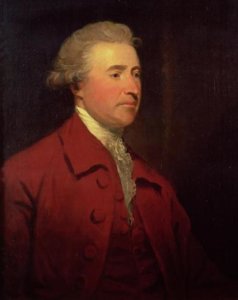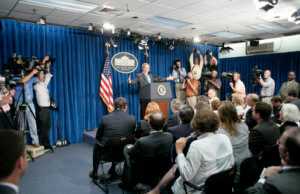
“Freedom of conscience, of education, of speech, of assembly is among the very fundamentals of democracy and all of them would be nullified should freedom of the press ever be successfully challenged.”
32nd US president, Franklin D. Roosevelt
A free and independent press is generally considered to be a cornerstone of democracy; without it, all other freedoms – of expression, of thought, of assembly – are seen to be at risk. This is because the press – and other forms of journalistic media – arguably play a vital role in keeping the electorate informed by providing them with opinion pieces on a range of issues of public importance, and by publicly subjecting the government’s policies to critical examination, thereby forcing politicians to explain their actions and decisions to the people they represent.

Indeed, the media’s role as the government’s watchdog has earned it the status of the “Fourth Estate”; a term which was first coined in 1787 by the British Member of Parliament, Edmund Burke, who used it to highlight the role of the press in keeping the other three “estates” of parliament in check. At the time, these were: (i) the clergy and (ii) the nobility which together made up the House of Lords; and (iii) the commoners who were represented within the House of Commons. In the US, which operates a presidential rather than parliamentary form of democracy, the term “Fourth estate” has come to signify the role of the media in holding the three branches of government – the legislature, the judiciary and the executive – to account.
For the media to effectively fulfil its role as the government’s watchdog, the individuals operating within it must be allowed to discuss and debate issues freely without fear of persecution. For this reason, the freedom of the press is generally regarded as sacrosanct in Western democracies, and countries such as Russia, China and Turkey – who impose various restrictions on their media – are often the subject of intense criticism. However, some would argue that we, in the West, should not be so quick to cast judgement on these other societies without first engaging in some critical self-reflection on the deficiencies of our own democratic systems and the way in which our media functions.
Perhaps one the most famous and hard-hitting critiques of the Western media has been put forward by the academics, Edward Herman and Noam Chomsky. In their book, Manufacturing Consent: the Political Economy of the Mass Media they argue that the US mainstream news media could be more realistically described as a “propaganda machine”, acting on behalf of the most powerful members of society to manufacture consent for their economic, political and social agendas:
“…the democratic postulate is that the media are independent and committed to discovering and reporting the truth, and that they do not merely reflect the world as powerful groups wish it to be perceived.[…] If, however, the powerful are able to fix the premises of discourse, to decide what the general populace is allowed to see, hear and think about, and to “manage” public opinion by regular propaganda campaigns, the standard view of how the system works is at serious odds with reality.” 1
Their book sets out a “Propaganda Model” which aims to explain how the structural forces of wealth and power influence media choices in the US. This model consists of five “filters” through which raw news material must pass before it reaches citizens. They argue that this results in systematic biases which “fix the premises of discourse and interpretation, and the definition of what is newsworthy in the first place”. 2 A short summary of each news filter is as follows:
Filter One: Ownership, size and profit orientation of media firms
According to Herman and Chomsky’s analysis, the majority of news output in the US is created by large media corporations who are: (i) owned by wealthy elites; (ii) run by managers answerable to the concerns of shareholders, and therefore primarily motivated by profit; or (iii) owned by other companies (conglomerates) which have a wide range of financial interests that extend beyond the media. These media corporations and their owners also have close ties with the government which can grant or remove their licenses and provide them with a favourable or unfavourable policy climate. These interlocking relationships act as an important filter on the news, because information which may threaten the economic or political interests of any of these powerful groups may become subject to censorship or bias.
Filter Two: Advertising as the main source of income
A primary source of income for much of the US media is from advertising. As Chomsky and Herman explain, this is problematic because:
“Advertisers will want, more generally, to avoid programs with serious complexities and disturbing controversies that interfere with the ‘buying mood’. They seek programs that will lightly entertain and thus fit in with the spirit of the primary purpose of program purchases – the dissemination of the selling message.” 3
Investigative journalism that exposes information which may be detrimental to advertisers’ interests may therefore end up being relegated below other, lighter news items. Moreover, they argue that this reliance on advertising revenue means that the media are incentivised to attract more privileged audiences who have greater purchasing power. This has the potential to marginalise the poorer, working classes whose interests may be left unattended.
Filter Three: Reliance on particular sources of information

The third filter relates to Herman and Chomsky’s assertion that the media rely heavily on the government and major businesses as sources of information for their news, drawing them into a “symbiotic relationship”. This dynamic is seen to have arisen primarily for economic reasons: the media needs a steady supply of news stories, resulting in a tendency for reporters to cluster in areas where significant news occurs i.e. around government institutions and business or trade organisations. More worryingly, Herman and Chomsky argue that this dynamic results in a general reluctance, on the part of the media, to criticise the materials or “facts” they are given by these powerful sources:
“The media may feel obligated to carry extremely dubious stories and mute criticism in order not to offend their sources and disturb a close relationship. It is very difficult to call authorities on whom one depends for daily news liars, even if they tell whoppers.” 4
These powerful sources are also arguably able to “manipulate” the media by inundating them with stories that promote a favourable image of their activities (a phenomenon which has come to be known as “spin”). Herman and Chomsky claim that this manipulation can even extend as far as “shaping the supply of “experts’”, with the government or businesses “putting them on the payroll as consultants, funding their research and organising think tanks that will hire them directly.”5 Such activities are designed to dilute or weaken alternative viewpoints put forward by other voices, and according to Herman and Chomsky, leads to a convergence of prevailing messages that benefit the most powerful interests in society.
Filter Four: “Flak” as a means of discipline
The term “flak” refers to “negative responses to a media statement or programme”.6 This could take the form of letters of complaint, phonecalls, petitions, lawsuits, speeches, punitive actions and even threats. If powerful interests are able to produce “flak” on a large enough scale, this can be very costly to the media especially if it means they are required to defend their position publicly or within the courts. It may also result in advertisers withdrawing their business. According to Herman and Chomsky, this deters media organisations from producing programmes which are likely to elicit “flak” – i.e. news items that present arguments that are counter to prevailing views and the interests of powerful elites.
Filter Five: Anticommunism as a control mechanism
Manufacturing Consent was written during the Cold War, when Communism was a “spectre haunting property owners, as it threatened the very root of their class position and superior status”.7 This, it is argued, resulted in a convergence of interests between the government, business elites and the media, leading to the creation of an “anti-communist” ideology which attempted to “mobilise the populace against an enemy”8; a clever distraction and misdirection technique which encouraged the public to concentrate on an enemy abroad rather than critically reflect upon the situation at home. In particular, it is noted that the charge of “communist” was often used within the media against anyone advocating policies that threatened the interests of powerful groups. Today, the parallel scenario could be seen to be the ideological convergence of the government, business and the media in relation to the maintenance of the neo-liberal, globalised world order.
When Manufacturing Consent was released, it caused a great stir and was met with hostile criticism. The Propaganda Model greatly divided opinion, and continues to do so today, with some viewing it as too simplistic, some denouncing it as a conspiracy theory, and others largely agreeing with its findings. We are, in the main, sympathetic towards the ideas contained within the Propaganda Model and find the examples and evidence provided in Herman and Chomsky’s book compelling. However, we also believe that it is possible to find many examples of journalists who have acted with high levels of integrity, reporting without fear or favour to uncover corrupt activities that undermine the fundamental values of our democracy. What Herman and Chomsky’s model teaches us is the need to be critical about the information we receive: Where does it come from? How has it been funded? What are its underlying assumptions? And, most importantly, whose interests does it serve? These are just some of the questions we should ask of any news story in order to prevent ourselves from becoming wilful collaborators in someone else’s propaganda campaign.
Further Resources
To support and complement your reading of Herman and Chomsky’s book Manufacturing Consent: the Political Economy of the Mass Media, it is well worth watching the film Manufacturing Consent: Noam Chomsky and the Media (produced by Mark Arhbar and Peter Wintonick) which explores the political life and ideas of Noam Chomsky.
The website https://chomsky.info/ also contains a wide range of useful resources on Noam Chomsky’s broader work and provides links to interviews and public debates he has participated in.
We have also included some additional video resources on this topic on our Mind Attic YouTube channel playlist


